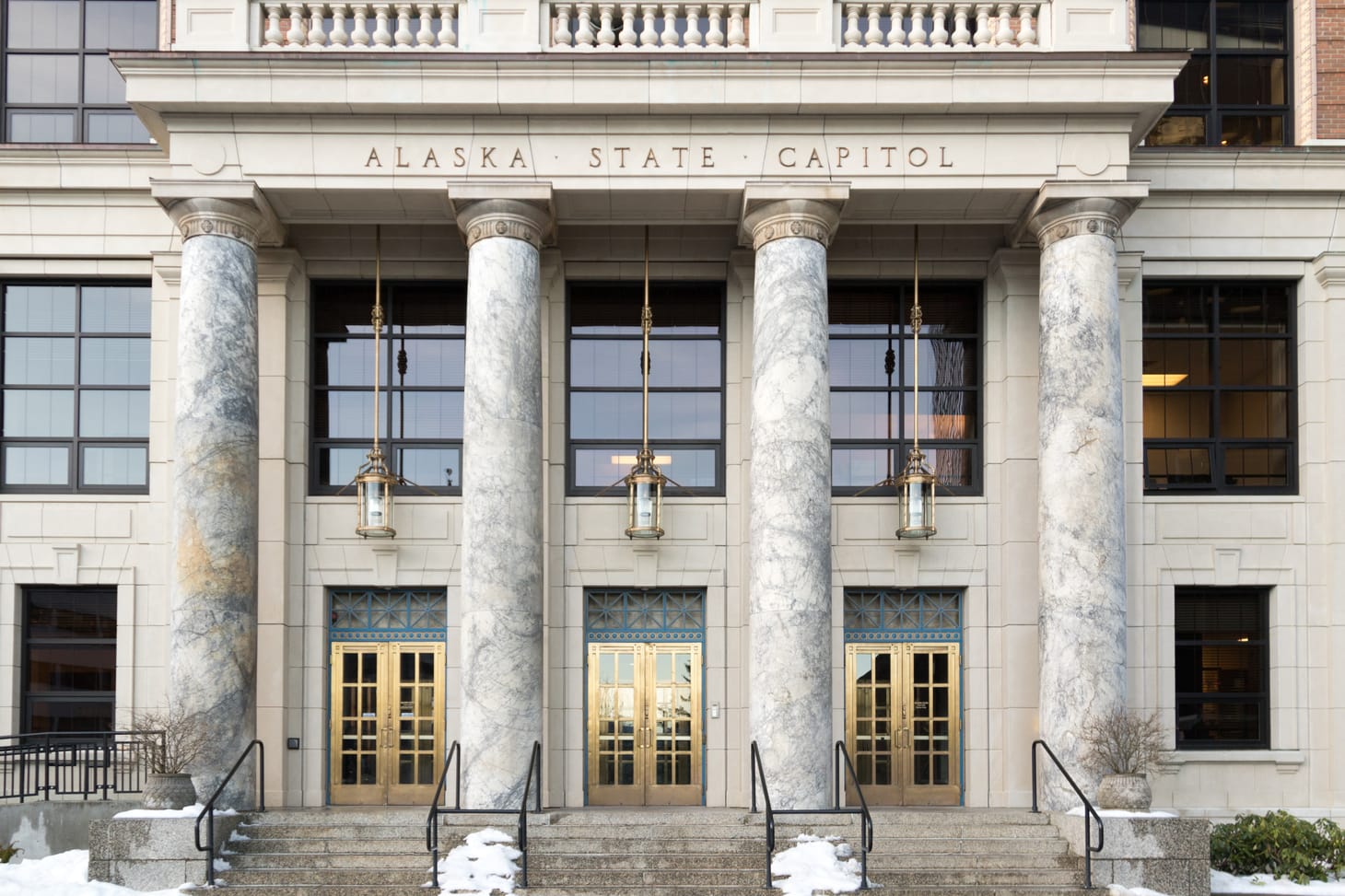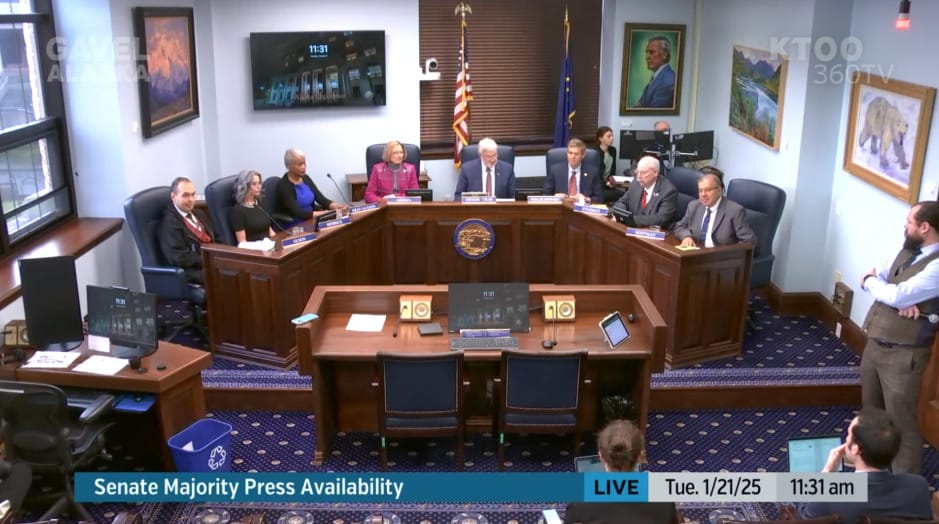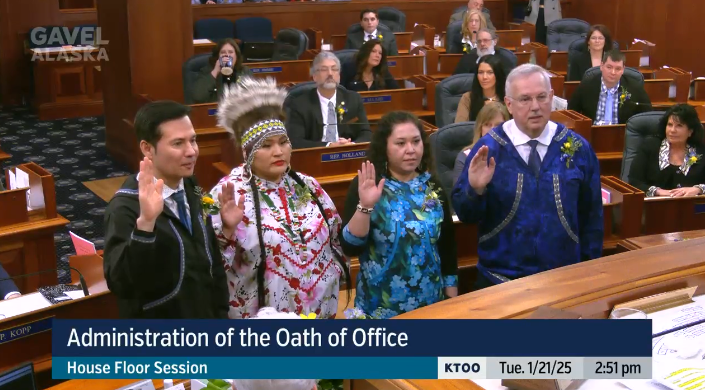AKLEG Day 1: 'There is no way that we can afford that.'
In a day filled with formalities, the 34th Alaska Legislature got underway today. The Senate Majority also gave us a good outline of the session on issues like education funding, worker retention, energy and the budget.

Happy First Day of Session, Alaska!
In this edition: In a day filled with formalities, the 34th Alaska Legislature got underway today. With oaths of office and the selection of leadership—which was much less exciting given both chambers have clear-cut majorities—there wasn't much to write home about, but the Senate Majority's presser gave us a good outline of the session when it comes to issues like education funding, worker retention, energy and the budget. It's nice to be back!
Current mood: 🎉
Day 1: 'There is no way that we can afford that.'

Correction: Senate President Gary Stevens is from KODIAK. Not another community that starts with a K... OOPS.
The Alaska Legislature gaveled in today, marking the start of the 34th Legislature that will serve the next two years. As was the case with the start of most sessions, the day was focused on the formalities of swearing in legislators and selecting each chamber's leadership. In the Senate, the 14-member majority selected moderate KODIAK Republican Sen. Gary Stevens for another term as Senate President. In the House, the 21-member majority put Dillingham independent Rep. Bryce Edgmon back in the Speaker's seat, which he held from 2017 through 2020.
The new session marks the first time in recent memory that bipartisan or multipartisan majorities control both chambers, and it'll also be the first time that the House has a majority of women. Among the 21 women in the Alaska House, the three Alaska Native women—Reps. Maxine Dibert, Nellie Unangik Jimmie and Robyn Niayuq Burke—are the most in the chamber's history.

As Speaker Edgmon said after being elected, the House is also looking younger in terms of longevity and age. Rep. Dibert also highlighted this with me when looking ahead to the session: there are more young people and parents in the Legislature who will be driving big-time decisions during this session.
Education is at the top of both majority's priority lists heading into the session. At the Senate Majority's press availability, Senate Rules Committee Chair Sen. Bill Wielechowski, D-Anchorage, said a bill to raise the per-student funding formula–known as the base student allocation, or BSA–would be coming shortly.
"We've seen exploding classroom sizes all across the state, we've seen increased teacher vacancies all across the state, and we have a real crisis in education. We have not increased the base student allocation since 2017, and with inflation and rising costs, our schools have fallen behind," he said. "We need to desperately do something for schools this year."
Interestingly, he also said that the funding and policy discussions should stay separate. That's a nod at Gov. Mike Dunleavy and House Republicans' attempts to leverage much-needed funding for pet issues like charter schools and his poorly justified plan to give teachers one-time bonuses rather than address the underlying causes of the shortages.
On that front, worker recruitment and retention are also key priorities for the two majorities. Sen. Cathy Giessel, R-Anchorage, has already reintroduced her pension bill from the last session, proposing a decidedly non-deluxe public employee pension system. She noted at the availability that the cost of switching to the plan is modest–about $45 million annually–in comparison to its benefits of keeping talented and knowledgeable employees from moving to other states.
"It's dependable but not fancy," she said, likening her plan to a Chevy when the old plans that ended decades ago were gold-plated Cadillacs.
Giessel also commented on Trump's flurry of Alaska-related action from his first day of executive orders, warning they shouldn't throw caution to the wind.
"We are actually already are open to resource development. We have Willow and Pikka both moving forward up on the North Slope and, at the same time, I think it's important for us to think about the fact that we're not a colony to be pillaged," she said. "And by throwing open all of the regulations related to resource development, we could be jeopardizing our lands and waters. This is the time for us to look at managing our own land and water."
To be clear, Giessel is not some greenie. She clarified that she's advocating for the state to have a more direct role in authorizing projects (which would likely mean more development than the feds have allowed). She also noted that while the orders were focused on boosting oil, gas and mining, they didn't address fisheries.
"My concern is that we know how best to permit these kinds of projects. We know how to protect our water, how to protect our land, and how to protect our air," she said. "Throwing out all of those safeguards is not prudent."
Also on the agenda is an election reform bill that seems to be a bit of everything for everyone. Sen. Wielechowski said it's set to be introduced shortly and would address the state of the state's voter rolls (there's been a plan floating around that would shorten the time it takes to remove someone for inactivity), hasten results and also address the state's witness signature requirement on absentee ballots, which he said is "meaningless." The witness signature isn't cross-checked against anything—Wielechowski noted officials said you wouldn't get flagged for signing Mickey Mouse—so it's never been used to catch fraud and instead has contributed to a disproportionate number of ballots in rural Alaska being thrown out.
And then there is, of course, the budget.
"There is no way that we can afford that," was the blunt assessment from Senate Finance Committee co-chair Sen. Lyman Hoffman, D-Bethel, of the $3.5 billion deficit contained in Gov. Mike Dunleavy's budget proposal.
Hoffman and his fellow co-chairs, Sens. Bert Stedman and Donny Olson, shared a similarly chilly outlook on the budget this year. Stedman oversees the capital budget and said this year's budget won't include much new project spending. There also seemed to be little appetite for drawing down on savings, which would not only be politically tricky but could put the state in dire straits if oil prices fall.
The big driver of that $3.5 billion deficit is the governor's dogged insistence on including a full dividend according to the long-ignored formula.
Stedman indicated that the Senate is largely coalescing around the status quo plan of a 75-25 split of the spendable revenue from the Alaska Permanent Fund between government spending and the dividend. But he said even hitting the 25% mark this year could be difficult.
"The statutory dividend doesn't work," he said. "I think that the sooner we can get the discussion underway within the state on revamping that formula, the better off we will be in our process."
Will this finally be the year that the dividend formula gets approved?
Stay tuned!
Follow the threads
The Alaska Memo Newsletter
Join the newsletter to receive the latest updates in your inbox.




